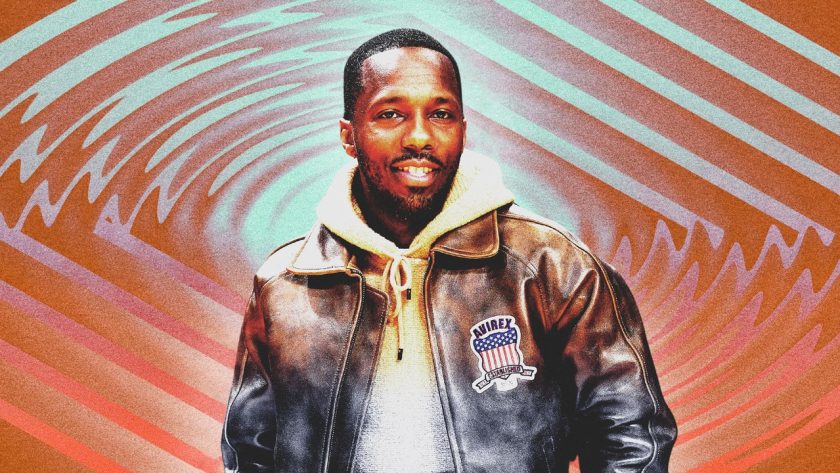You can count the number of books written by sports agents on one hand. And you can count the number of good books written by sports agents on Captain Hook’s hand. (The pointy one.) Earlier this month, Klutch Sports founder and CEO Rich Paul joined the latter group with Lucky Me, a sharp, honest memoir (written with Jesse Washington) detailing his upbringing in Cleveland—everything, basically, that happened before he met a teenaged LeBron James at the airport in Akron, Ohio.
What Paul has done in the years since is the stuff of modern sports legend: he spent a few years doing a little bit of everything for an early-career LeBron before deciding to become an agent, spending a few unproductive years at CAA before launching Klutch (with, of course, one particularly high-profile client). And Paul, 41, has built Klutch into a powerhouse, establishing it as perhaps the premiere agency of the NBA’s player empowerment era—the agency you sign with if you’d like a greater say over where you play next. (Hollywood agency UTA acquired a stake in 2019). And he’s done it all in a style all his own: Paul is the rare agent with a sneaker collab, and certainly the only one in a relationship with Adele.
That’s because, as he explained to me over lunch at Klutch’s Beverly Hills offices recently, he doesn’t much care for the traditional rules that govern a job like his. “I think you have agents, and then you have businessmen,” he said. “I’m a businessman. I’m not an agent. And that’s no knock to agents, because I do wear an agent hat at the time I need to wear it. But I’m not on the phone talking to clients about nothing and pretending to be important. That’s not what I do out there.”
GQ: In Lucky Me, you write about the importance of discipline and consistency in your own life. What’s something you make sure to do every morning?
Paul: Pray. I try to say a prayer every morning and every night, but obviously depending on what’s going on around that time. But it’s pretty consistent across the board. I’ve been saying the same prayer since my mom taught me how to pray. It starts with, “Our father.”
How about self-care, or exercise?
I started meditating a little bit. I get in the sauna. I get in the cold tub. I work out every morning.
What got you started meditating? Sometimes people come to it because they’re curious. And other times, they’ll have a friend who’s like, “You know, you should do this.”
I have a few friends.
No. No, it wasn’t him. No. It’s mainly getting some time to yourself. Because we work a job where it’s about everybody else, pretty much.
Right. You’re in service to your clients. But it’s also not exactly a conventional office job. You are available all the time. Was that ever a difficult adjustment for you?
Yeah. Because I came from a place where I made my own schedule pretty much. But organically, over time it started to happen. (Growing up) I realized school is really about habits. You got to be to school before the bell rings. You got class, then you do your homework after class or when you get home. So I started developing these habits where, as soon as I got home, I would do my homework. And I talk to my son about this right now: Don’t wait, do it while it’s fresh on your mind.
So it wasn’t like I discovered something. It was just that I didn’t have a job, per se, where I had to really punch a clock. Didn’t mean I didn’t have scheduling, because my schedule was like, “Oh, I got to take my clothes to cleaners. I’m going to get me something to eat. I’m going to go to the rec and play from 1:00 to 3:00.” Once I was able to build my business, I was never really an office person because at heart, I’m a creative. So I like to move around and be into things. And then when I started embracing the office and the calendar, my day just changed. And so now it’s hard for me to not be in the office. If I’m in LA, I’m in the office.
When you were a kid, what did success look like for you?
Man, it varied, right? Success was, like, going outside and there’s actually people outside to play with. And then going outside, and we play a game of football, and I score a touchdown. I felt like I was this superstar on my street. We used to make these cardboard belts, like wrestling belts, but you would carry the belt if you were the intercontinental champ in street football. That was success.
And then some days success was just having something to eat, man. Because my life and my days were a rollercoaster. You could have four hours where you feel like the Fresh Prince of Bel-Air, and you can have 20 hours where you feel like the loneliest kid in the world.
One of the things you write about is growing up in a world where it wasn’t always easy or encouraged to take the long view of success. When did that start to come into focus for you?
It gradually started happening over time. Honestly, I just started to really be okay, like, breathing, in 2019. I felt like I had positioned myself enough by then to where I knew how to build a business, I had success building a business, I had a very holistic understanding on what success look like. I felt that I now had clarity on business.
There’s this great scene in the book of you, as a kid, ironing your bankroll. You’re 11 years old, winning thousands of dollars gambling. Literally ironing dollar bills, straightening them out, crisping them up. How has your relationship to money changed over time?
I’m happy that I got to know money at a very early age. It’s all relative, because I handled money a lot as a young kid. And handling $10 at five years old, it is no different than handling a million dollars at 25. And I was happy that I was around what, at the time in my world, was a lot of money. Cash was prevalent. I seen my dad count. I gambled. I seen everything with money, money, money, money, money. I had this business perspective at a very early age. Everything was business. Everything was a bet. And so my perspective was much more business than it ever was play. I wasn’t a kid that horseplayed. I wasn’t a kid that played video games. Everything I did for the most part, outside of sports, came with a transaction. Even in sports, I wanted to get so good to where if somebody ever betted me, I had the ability to win. That’s really what it was about. And people used to bet on me as a kid.
You write a lot about loving gambling—sometimes loving it too much. Are you more or less of a gambler now than you were growing up?
Way less. First of all, how and where I like to gamble, I can’t go there like that. It’s not ideal. It’s not safe. It’s not a number of things. Not just for me per se, just in general.
And what’s the ideal Rich Paul gambling scenario?
It’s a dice game. Anywhere in the world.
Think you still got it?
Hell yeah. I would love a great dice game, amongst gentlemen though. Not the world I come from.
Money appears in your book often next to style, or fashion, or self-presentation. And I think you make a really compelling case in the book for why those aren’t frivolous things. How have you carried those lessons with you into your professional life?
If I walk in the boardroom tomorrow, everything matters. My haircut, my watch, what I decide to wear, my cologne, everything matters. And you’d be surprised, because oftentimes you may be in a situation where it’s not the person that you’re looking to give a comment that actually gives a comment, and raises the awareness to the person that you actually are looking for the comment from. Not that I’m looking for it, but most people are. Maybe your wife says, “Sam, that guy was really dressed really nice. Wow. Love that sweater.” Now the perception of me to you changes. So I’ve always been that type of person.
And as far as I can tell, you’re the only agent who has a signature shoe. That doesn’t hurt, I bet.
Most agents aren’t cool. You don’t have to be afraid to say it.
Why aren’t most agents cool? Or why did it take so long for someone like you to come around and show that that’s a thing you could do successfully?
Well, having that connectivity, that relatability, you’re born with that. It is also a part of your development. So where I came from, my NBA season, was getting fly every day. Every single day I had to have it on. I wanted the best of the best. When I was young, if I had $700 to my name, I’ll spend that whole 700 on one sweater. Again, we didn’t have much, but that was the one thing that I could hang my hat on. One thing I can control, I’m going to control, and that’s how I look. I was never afraid to take risks. I was never afraid to spend it all on one item. I was wearing $200 T-shirts in ’95, ’96.
I didn’t even know we were doing that then.
Coogi made what they called a T-shirt. But they used to have a hat to match, had that, the hat was like $135 back then. I was wearing Moschino and Iceberg and Versace, all that type of stuff back then. I wasn’t afraid to spend the money. I spent the money. I had every shoe. That was what I was known for, having every shoe. And that became part of my legend, so to speak.
Tell me about when you decide to actually become an agent.
It’s, like, 2006 or ’07 where I started thinking that’s what I wanted to do.
Because the first couple of years you’re with LeBron, he’s like, “We’ll figure out a job.”
Yeah. And then I landed there because I had an ability to cultivate relationships with players, but I also knew the game. I like to talk sports. But when I started to pay attention to what agents actually did, that’s when I was like, “I could definitely be an agent.” But then that changed as well. I was like, “No, I want to be this type of agent.”
When you say “this type of agent,” what do you mean?
I didn’t just want to be an agent. I didn’t want to be somebody that’s walking on eggshells or tiptoeing around a client. Lying to their family, telling them what they want to hear, which is what most agents do, pretty much. Not all, but most. And I also didn’t want to just look at it as a job. I wanted to make sure that I was adding value to those that appreciated the value, because everybody don’t.



